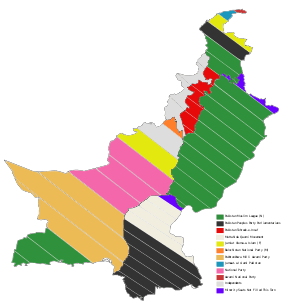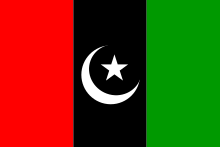2015 Pakistani Senate election
Senate elections were held in Pakistan on 5 March 2015 to elect the replacements for 52 retiring senators. Those retiring include chairman Nayyar Hussain Bukhari and deputy chairman Sabir Ali Baloch of the upper house. Pakistan Peoples Party (PPP), the majority party in Senate, would lose 21 members, followed by Pakistan Muslim League Nawaz would lose 9 and Awami National Party would lose 6 members.[1][2]
| |||||||||||||||||||||||||||||||||||
52 of the 104 seats in the Senate of Pakistan 53 seats needed for a majority | |||||||||||||||||||||||||||||||||||
|---|---|---|---|---|---|---|---|---|---|---|---|---|---|---|---|---|---|---|---|---|---|---|---|---|---|---|---|---|---|---|---|---|---|---|---|
| |||||||||||||||||||||||||||||||||||
 | |||||||||||||||||||||||||||||||||||
| |||||||||||||||||||||||||||||||||||
According to the schedule issued by the Election Commission of Pakistan (ECP), nomination papers for the election were submitted on 12 and 13 February, while scrutiny of the papers was held on 16 and 17 February. The list of contesting candidates was issued on 25 February. Polling for the 52 seats will be held on 5 March. For 11 seats, each of the four provinces' polling will be held in the provincial capitals, while polling for seats from the federal capital and FATA will be held in the National Assembly. According to the ECP notification, in each province elections will be held for seven general seats, two seats for technocrats and Ulema and two reserved seats for women.[3][4]
Elections are held indirectly; to win one seat in Senate, the candidates would require 52 votes from the Punjab Assembly, 24 from the Sindh Assembly, 18 from the Khyber Pakhtunkhwa Assembly and 9 from the Balochistan Assembly.[5][6]
Election Day
According to The Express Tribune, four contestants already elected unopposed in Sindh – two each from the PPP and MQM – voting was held for the remaining 48 seats with members of the provincial assemblies electing senators on their respective provincial quotas – seven for Sindh, 11 for Punjab, 12 each for Khyber-Pakhtunkhwa (K-P) and Balochistan for different categories of seats. Members of the National Assembly will be voting for two seats for Islamabad Capital Territory (ICT) while MNAs from the Federally Administered Tribal Areas (Fata) will elect four senators from the tribal belt.
According to the final list of contestants notified by the Election Commission of Pakistan (ECP), 84 candidates will contest for 33 general seats from the provinces, Fata and the ICT while 22 candidates will contest for eight seats reserved for women in the provinces and ICT. Eighteen candidates will contest for eight seats reserved for technocrats, including Ulema, while eight others will run for two seats – one each from K-P and Balochistan – reserved for minorities.[7]
Violation of party discipline
According to the Pakistan Today, in clear violation of the party discipline, members of Khyber Pakhtunkhwa and Balochistan assemblies have proposed and seconded independent or other political parties’ nominees for the Senate elections.[8]
Election Fraud Allegations and Delays
- Khyber Pakhtunkhwa: Pakistan Peoples Party member of Khyber Pakhtunkhwa assembly, Nighat Orakzai claimed that the ballot papers are being taken to outside the assembly and being stamped, while talking to Dunya News. She alleged to be verbally abused by a government parliamentarians. Additionally, the media was barred from entering the premises of the Khyber-Pakhtunkhwa assembly. Around 11:00 am PST the polling was stopped at the assembly and failed to resume. A lengthy meeting between Chief Minister Pervez Khattak and opposition members took place to resume the voting process, however failed to resume the elections leading the provincial government recommending Election Commission to delay the vote.[9] ECP delayed polling in the K-P Assembly has been to 8pm PST.
- Federally Administered Tribal Areas: According to Radio Pakistan around 12:48pm, polling for the election of four Senators from FATA was stopped after protest from parliamentarians in protest from a Presidential ordinance restricts the representatives from FATA to just one vote instead of four votes.[10]
Candidates
Punjab
For Punjab, 15 candidates eyed seven general seats, four candidates eyeing two women-reserved seats and two candidates eyeing two technocrat seats.[11]
| Province | Name |
|---|---|
| Punjab | Pervez Rashid (PMLN) |
| Punjab | Mushahid Ullah Khan (PMLN) |
| Punjab | Abdul Qayyum (PMLN) |
| Punjab | Begum Najma Hameed (PMLN) |
| Punjab | Raja Zafar ul Haq (PMLN) |
| Punjab | Sajid Mir (PMLN) |
| Punjab | Nadeem Afzal Chan (PPP) |
| Punjab | Chauhary Tanveer Khan (PMLN) |
| Punjab | Dr Asif Kirmani (PMLN) |
| Punjab | Dr Ghous Niazi (PMLN) |
Khyber Pakhtunkhwa
For Khyber Pakhtunkhwa, 17 candidates ran for seven general seats.[12]
| Province | Name |
|---|---|
| Khyber Pakhtunkhwa | Lt-Gen (retd) Salahuddin Tirmizi(PMLN) |
| Khyber Pakhtunkhwa | Noor Alam Khan (PPP) |
| Khyber Pakhtunkhwa | Khanzada Khan (PPP) |
| Khyber Pakhtunkhwa | Maulana Gul Naseeb Khan (JUI-F) |
| Khyber Pakhtunkhwa | Maulana Shuja-ul-Mulk (JUI-F) |
| Khyber Pakhtunkhwa | Mohsin Aziz (PTI) |
| Khyber Pakhtunkhwa | Shibly Faraz (PTI) |
| Khyber Pakhtunkhwa | Fazal Muhammad (PTI) |
| Khyber Pakhtunkhwa | Salman Afridi (PTI) |
| Khyber Pakhtunkhwa | Samina Abid (PTI) |
| Khyber Pakhtunkhwa | Rabia Basri (PTI) |
| Khyber Pakhtunkhwa | Noman Wazir (PTI) |
| Khyber Pakhtunkhwa | Abdul Latif Yousafzai (PTI) |
Sindh
For Sindh, 18 candidates eyed seven general seats, six candidates eyeing two women seats and four candidates eyeing two technocrat seats
| Province | Name |
|---|---|
| Sindh | Mian Atiq ur Rehman (MQM) |
| Sindh | Barrister Muhammad Ali Saif (MQM) |
| Sindh | Nighat Khatoon (MQM) |
| Sindh | Raza Zaidi (MQM) |
| Sindh | Farooq Naek (PPP) |
| Sindh | Rehman Malik (PPP) |
| Sindh | Islamuddin Shaikh (PPP) |
| Sindh | Saleem Mandviwalla (PPP) |
| Sindh | Gyan Chand (PPP) |
| Sindh | Abdul Latif Ansari (PPP) |
| Sindh | Sassui Palijo (PPP) |
| Sindh | Syed Zafar Ali Shah (PMLN) |
Balochistan
In Balochistan’s Senate elections Niamatullah Zehri of PML-N, Abdul Ghafoor Haidery of JUI-F, Usman Kakar and Sardar Mohammad Azam Khan of Pakhtunkhuwa Milli Awami Party, Hasil Khan Bazenjo of National Party, Dr Jahanzaib Jamaldini of BNP (Mengal), and Yousaf Badeni (independent) have been elected.
Mir Kabir Ahmed of National Party and Engineer Agha Shahbaz Khan Durrani of PML-N were elected as senator on Technocrats while Kalsoom Perveen of PML-N and Gul Bashra of Pakhtunkhwa Milli Awami Party won the elections on women reserved seats.
Dr Ashok Kumar of National Party was elected as senator on minority seat.
Results
According to unofficial results released by Dunya News, Pakistan Muslim League (N) won 16 seats, Pakistan People’s Party (PPP) got seven, Pakistan Tehreek-e-Insaf won five, Muttahida Qaumi Movement (MQM) collected four, the National Party and Pukhtunkhwa Milli Awami Party got three seats each, Balochistan National Party and Jamiat Ulema-e-Islam (F) got one seat each while an independent candidate also became senator from Balochistan. The PML-N and its allied parties in the province including NP and PkMAP won nine seats.[13]
Results by Administrative Unit
Provinces
| Punjab | |||||||
|---|---|---|---|---|---|---|---|
| Seat Type | Winners | ||||||
| General | Mushahid Ullah
(PML-N) |
Pervaiz Rashid
(PML-N) |
Nehal Hashmi
(PML-N) |
Abdul Qayyum
(PML-N) |
Chaudhry Tanvir
(PML-N) |
Saleem Zia
(PML-N) |
Ghaus Khan Niazi
(PML-N) |
| Technocrat | Raja Zafar-ul-Haq (PML-N) | Sajid Mir (PML-N) | |||||
| Women | Najma Hameed (PML-N) | Ayesha Raza (PML-N) | |||||
Composition
Before 2015 elections
| 40 | 16 | 12 | 36 |
| Pakistan Peoples Party | Pakistan Muslim League Nawaz | Awami National Party | Others |
After 2015 elections
| 27 | 26 | 7 | 6 | 38 |
| Pakistan Peoples Party | Pakistan Muslim League Nawaz | Awami National Party | Pakistan Tehreek-e-Insaf | Others |
References
- "ECP postpones Senate Elections to March 5th". Archived from the original on 2015-05-07. Retrieved 2015-02-14.
- PPP, MQM hope to win Senate elections unopposed
- Govt waiting for 2015 Senate change to bring new laws
- "PTI likely to keep NA seats for Senate election". Archived from the original on 2015-04-14. Retrieved 2015-02-14.
- "Political parties expedite campaign for Senate elections". Archived from the original on 2015-02-14. Retrieved 2015-02-14.
- PML-N announces candidates for Senate polls
- LIVE: Polling for Senate elections underway
- Senate polling suspended in Punjab, KP assemblies on rigging claims
- Senate elections: Polling stopped in KP Assembly after rigging allegations
- MNAs from FATA likely to boycott Senate elections over issuance of presidential ordinance
- Parties announce candidates for Senate poll
- candidates in run for 52 Senate seats
- PML-N takes the cake, PPP eyes cherry

.svg.png)

.svg.png)